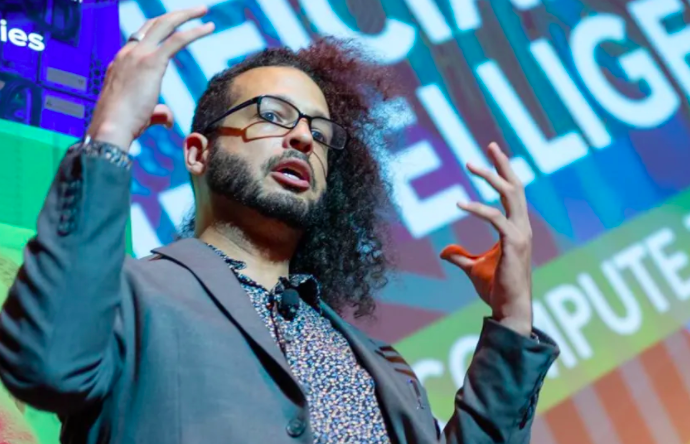Dr. Nord is available as a Keynote or Graduation speaker. He is available to speak about scientific topics, popular STEM subjects, diversity and inclusion in STEM, and much more. Feel free to ask about his hackathons and community building activities in astrophysics. Every talk Dr. Nord gives is tailored to the specific audience he works with and provides an exciting, and powerful perspective on science and life.
Watch some of Dr. Nord’s Public Speaking Engagement below
2021
Becoming Interplanetary
This symposium, hosted by Lucianne Walkowicz, the Baruch S. Blumberg NASA/Library of Congress Chair in Astrobiology at the Library's John W. Kluge Center, featured panel discussions on how current narratives, policies and laws frame human exploration and presence in space. The panels included a diverse group of thought leaders including astrobiologists, anthropologists, policy experts, artists and journalists whose work has relevance to the human exploration of Mars. The panels included "Becoming Interplanetary" with Brenda J. Child, Brian Nord, Chanda Prescod-Weinstein and Ashley Shew.
2021 April Meeting Plenary: Advancing an Inclusive Community in Science
Addressing Systemic Oppression in Physics: From Root Causes to Strategic Action - Brian Nord, Fermilab, University of Chicago Evolving Physics to Support Underrepresented Communities - Dara Norman, NOIRLab Inclusive Education Practices - Geraldine Cochran, Rutgers University, New Brunswick
Argonne OutLoud: Paying It Forward: African Americans in Science Today for Tomorrow
Dr. Walter E. Massey has been a trailblazer throughout his career, opening doors for African Americans in the fields of science, business, and education. Included in his list of "firsts" is serving as Argonne's first African American Laboratory Director
Effecting Change: Individual Actions and Leadership
This webinar, designed as part of the American Physical Society Annual Leadership Meeting, focuses on how individuals can lead to effect change, particularly to increase diversity, equity, and inclusion (DEI). The discussion will begin with motivation—in this case, self-reflections on the value of diversity. We will then learn from the experiences of individual activists who have worked to increase DEI in physics, and will end with a discussion of how individuals can support organizational change.
2020
From Disruption, Opportunity - Dr. Brian Nord
Science Keynote: From disruption, opportunity: the current and future impact of AI on astronomy Dr. Brian Nord
2018
NOVA Wonders What's the Universe Made Of?
A 6-part series exploring the biggest questions on the frontiers of science.
AI in the Sky: Intelligent Machines in Science and Society, Brian Nord, Fermilab
In recent years, artificial intelligence (AI) algorithms have begun to revolutionize the roles of data and machines in our society. AI is an overarching term that describes the corpus of algorithms that learn patterns in data --- “machine learning.” This property of the algorithms is the principal source of both their strength and weakness: the algorithms must be taught, and how we teach them remains an active area of research.
2017
Fermilab and the New Frontiers of Physics
Fermilab celebrates its 50th anniversary in 2017. What does the future hold for this world-renowned laboratory in Chicago’s western suburbs—and for physics itself?
Josh Peek and Brian Nord talking about Dieleman+2015 in Keras
Physicist Dr. Brian Nord: Science Education = Social Justice?
Dr. Brian Nord Jr. is a research physicist at Fermi National Accelerator Laboratory in Batavia IL. He believes science education is a social justice issue. He explains his view to the Chicago Council on Science and Technology's Comedian in Residence Aaron Freeman.
2015
Andre Salles and Brian Nord (Fermilab)
Andre Salles is the Media and Community Relations Specialist at Fermi National Accelerator Laboratory. He has the task of writing stories about the amazing projects and advances happening at Fermilab. And he loves it, based on his frequent exclamations of, “This is where I work!”
2014
How to make physics snowflakes
Celebrate the season--and science!--with paper snowflake designs featuring Albert Einstein, Marie Curie, and Erwin Schrodinger. In this video, Fermilab physicists demonstrate snowflake-making methods worthy of a Nobel Prize. For instructions and templates for the rest of us, see
Got a Minute? The Large Hadron Collider: Why Large?
The Large Hadron Collider is the most powerful particle accelerator known to mankind. Why is it large? Dr. Brian Nord tells us more.
Big Mysteries: Extra Dimensions
The weakness of gravity compared to the other subatomic forces is a real mystery. While nobody knows the answer, one credible solution is that gravity has access to more spatial dimensions than the other three known forces. In this video, Fermilab's Dr. Don Lincoln describes this idea, with the help of some very urbane characters.
2013
Fermilab Physics Slam 2013
Fermilab's second annual Physics Slam, held on Nov. 15, 2013, featured five physicists vying to explain their area of study in the most entertaining way possible. Contestants included Don Lincoln, Tia Miceli, Hugh Lippincott, Chris Polly and Brian Nord, and the event was hosted by Chris Miller of the College of DuPage. Visit Fermilab online at http://www.fnal.gov. Follow the lab on Facebook at http://www.facebook.com/fermilab and on Twitter @FermilabToday.
2012
Dark Energy Survey
Members of the Dark Energy Survey collaboration explain what they hope to learn by studying the southern sky with the world's most advanced digital camera, mounted on a telescope in Chile. For further information on the project: http://www.darkenergysurvey.org
Brian Nord Jr. - Saturday Morning Physics
"The Shape of Our Universe: The Complexity of Large-Scale Structure and Large-Scale Science"
Brian Nord Jr. - Saturday Morning Physics
"Cosmic Engines: The Complex Evolution of Galaxies"




